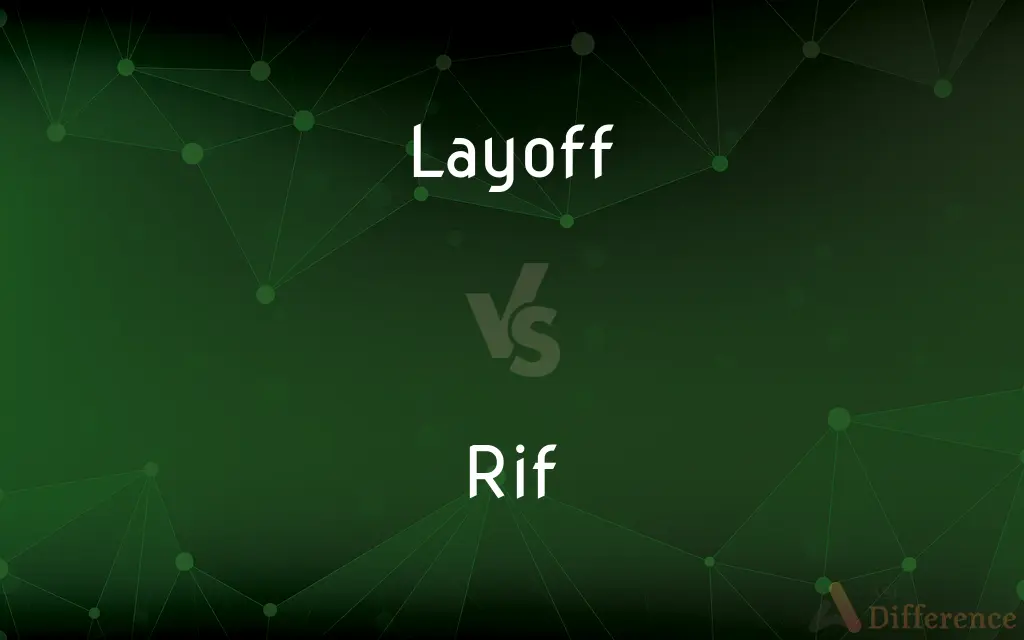Layoff vs. RIF — What's the Difference?
By Tayyaba Rehman & Urooj Arif — Updated on March 25, 2024
Layoffs are temporary or permanent separations due to business conditions, often reversible, whereas RIFs (Reduction in Force) are permanent cuts due to organizational restructuring or downsizing.

Difference Between Layoff and RIF
Table of Contents
ADVERTISEMENT
Key Differences
Layoffs are typically initiated by employers due to economic downturns, lack of work, or financial struggles, leading to temporary or permanent separation of employees. On the other hand, a Reduction in Force (RIF) is a more permanent action, often resulting from organizational restructuring, mergers, or the need to reduce operational costs permanently.
While layoffs might offer the possibility of rehire when business conditions improve, RIFs usually do not, as they reflect changes in the company's structure or business model. In contrast, RIFs are a strategic decision to streamline operations or adapt to new market realities, often not contingent on short-term economic recovery.
Employees laid off may receive temporary benefits or severance packages, and sometimes companies offer support for re-employment. In RIF scenarios, employees are also likely to receive severance packages, but the emphasis is more on severance and less on the possibility of return, reflecting the permanent nature of the separation.
Layoffs can affect the morale of remaining employees, who may fear their job security; however, this impact can be somewhat mitigated if the layoffs are clearly communicated as temporary. With RIFs, the impact on morale can be more profound, as the changes are permanent and may involve significant restructuring, signaling a more uncertain future.
The legal considerations for layoffs and RIFs can vary, with RIFs often requiring more extensive planning and documentation to avoid legal complications, especially if they involve large numbers of employees or are likely to be scrutinized for fairness and nondiscrimination.
ADVERTISEMENT
Comparison Chart
Nature
Temporary or permanent separation due to business downturns
Permanent job elimination due to restructuring or downsizing
Rehire Possibility
Possible, especially if the layoff is temporary
Unlikely, as the positions are permanently eliminated
Reason
Economic conditions, lack of work
Organizational changes, cost reduction, mergers
Severance
Often provided, with potential re-employment assistance
Typically includes severance packages, less focus on rehire
Impact on Morale
Can be significant, but mitigated if seen as temporary
Generally more profound due to permanent changes
Compare with Definitions
Layoff
A layoff is a temporary or permanent separation from employment due to economic reasons.
The company announced layoffs due to the economic downturn.
Rif
Employees affected by a RIF typically receive severance packages but no promise of rehire.
Employees impacted by the RIF were given severance packages and outplacement services.
Layoff
Layoffs are often used by companies to reduce payroll expenses during financial struggles.
To cut costs, the tech firm initiated layoffs across several departments.
Rif
RIFs can lead to significant changes in a company's structure and employee morale.
The RIF led to a leaner organization but also lower morale among remaining staff.
Layoff
Employees laid off may be eligible for rehire when business conditions improve.
The laid-off workers were told they could be rehired once sales rebounded.
Rif
A RIF is a permanent elimination of positions within a company due to restructuring.
The merger led to a RIF to eliminate redundant roles.
Layoff
Layoffs can affect a wide range of positions and levels within a company.
The recent layoffs affected both entry-level and senior positions.
Rif
RIFs are often part of a strategic plan to streamline operations or adapt to market changes.
The RIF was part of the company's shift towards more digital services.
Layoff
Companies might offer severance packages to laid-off employees as support.
The laid-off employees received severance packages to aid their transition.
Rif
Legal considerations are crucial in planning and executing a RIF to ensure compliance.
The company carefully planned the RIF to comply with employment laws and avoid discrimination claims.
Layoff
A layoff or downsizing is the temporary suspension or permanent termination of employment of an employee or, more commonly, a group of employees (collective layoff) for business reasons, such as personnel management or downsizing (reducing the size of) an organization. Originally, layoff referred exclusively to a temporary interruption in work, or employment but this has evolved to a permanent elimination of a position in both British and US English, requiring the addition of "temporary" to specify the original meaning of the word.
Rif
The Rif or Riff (Berber languages: ⴰⵔⵔⵉⴼ, ⴰⵔⵉⴼ, romanized: Arrif, Arif; Arabic: الريف), also called Rif Mountains, is a geographic and cultural region in northern Morocco. This mountainous and fertile area is bordered by Cape Spartel and Tangier to the west, by Berkane and the Moulouya River to the east, by the Mediterranean to the north, and by the Ouergha River to the south.
Layoff
The act of suspending or dismissing an employee, as for lack of work or because of corporate reorganization.
Layoff
A period of temporary inactivity or rest.
Layoff
A dismissal of employees from their jobs because of tightened budgetary constraints or work shortage (not due to poor performance or misconduct).
Layoff
A period of time when someone is unavailable for work.
Layoff
A short pass that has been rolled in front of another player for them to kick.
Layoff
A bet that is laid off, i.e. placed with another bookmaker in order to reduce risk.
Layoff
The act of laying off an employee or a work force
Common Curiosities
What triggers a layoff?
Layoffs are usually triggered by short-term financial pressures, economic downturns, or decreased demand for products or services.
What legal considerations accompany a RIF?
RIFs require careful planning to ensure compliance with labor laws, avoid discrimination, and manage severance and notifications properly.
How do layoffs and RIFs impact company morale?
Both can negatively impact morale, but RIFs may have a more profound effect due to their permanent nature and the potential for significant organizational changes.
How does a RIF differ from a layoff?
A RIF is a permanent elimination of positions due to long-term strategic changes, unlike layoffs, which can be temporary and due to short-term economic conditions.
Can laid-off employees expect to be rehired?
Laid-off employees may be rehired if the layoff is temporary and business conditions improve, unlike in RIFs where the positions are permanently eliminated.
Are severance packages mandatory in layoffs or RIFs?
Severance packages are common but not mandatory in both layoffs and RIFs, often depending on company policy and the terms of employment contracts.
How do international laws affect layoffs and RIFs for global companies?
Global companies must navigate varying labor laws in each country, which can significantly affect how layoffs and RIFs are executed.
Can layoffs evolve into a RIF?
Yes, what starts as a temporary layoff due to economic conditions may evolve into a RIF if the company decides to make structural changes.
Can a RIF be challenged legally by employees?
Yes, employees can legally challenge a RIF if they believe it was executed unfairly or in violation of labor laws.
How do companies support employees affected by layoffs or RIFs?
Companies may offer severance packages, outplacement services, and counseling to support affected employees.
What role does HR play in managing layoffs and RIFs?
HR plays a crucial role in planning, communicating, and executing layoffs and RIFs, ensuring they are carried out ethically and in compliance with laws.
Is a RIF always the result of financial difficulty?
Not necessarily; RIFs can also result from strategic decisions to restructure or realign the company's focus, not just financial issues.
Do all industries use layoffs and RIFs in the same way?
Practices can vary by industry based on regulatory environments, the nature of the work, and business models.
How do companies decide who is affected by a layoff or RIF?
Decisions can be based on factors like job performance, seniority, business needs, and the specific goals of the layoff or RIF.
Share Your Discovery

Previous Comparison
Predicate vs. Complement
Next Comparison
Asynchronous vs. ConcurrentAuthor Spotlight
Written by
Tayyaba RehmanTayyaba Rehman is a distinguished writer, currently serving as a primary contributor to askdifference.com. As a researcher in semantics and etymology, Tayyaba's passion for the complexity of languages and their distinctions has found a perfect home on the platform. Tayyaba delves into the intricacies of language, distinguishing between commonly confused words and phrases, thereby providing clarity for readers worldwide.
Co-written by
Urooj ArifUrooj is a skilled content writer at Ask Difference, known for her exceptional ability to simplify complex topics into engaging and informative content. With a passion for research and a flair for clear, concise writing, she consistently delivers articles that resonate with our diverse audience.














































